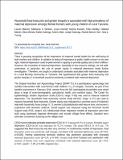| dc.description.abstract | There is growing recognition of the importance of maternal mental health for the well-being of both mothers and children. In addition to being of importance to public health concern on its own right, maternal depression could impede women's capacity to provide quality care to their children. However, the covariates of maternal depression, especially in low-resource settings, are not well-understood. In particular, the role of gender equity in maternal depression needs further investigation. Therefore, we sought to understand covariates associated with maternal depression in a rural farming community in Tanzania. We hypothesized that greater food insecurity and gender inequity in a household would be positively correlated with maternal depression.
The Singida Nutrition and Agroecology Project (SNAP-Tz) is a participatory agroecology and nutrition intervention with rural farmers with children <1 y in Singida, Tanzania. As part of the baseline assessment in February 2016, women from the 587 participating households were asked about a range of socio-demographic, agricultural, health, and nutrition topics. The Center for Epidemiologic Studies Depression Scale (CES-D, range: 0–65) was used to measure maternal depression. The Household Food Insecurity Access Scale (HFIAS, range: 0–27) was used to measure household food insecurity. Gender equity was indicated by a summed score of husband's help with household chores (range: 0–7), women's (dis)satisfaction with leisure time, and women's experience with domestic violence. Social support was measured using the Perceived Social Support scale (PSS, range:0–40). Multivariate linear regression models of depression were then built using backwards stepwise elimination and include village fixed effects. Standard error estimates considered clustering at the village level.
CESD scores indicated probable depression (CES-D≥17) among 69.2% of women. Probable major depression (CES-D≥26) was indicated for 42.5% women. The mean HFIAS of 14.0 (sd: 7.9) suggested that food insecurity was also very common. In multivariate models of depression, food insecurity score was positively and strongly correlated with maternal depression score (β=0.62, p=0.000). Having experienced domestic violence was positively associated with increased maternal depression score (β=4.29, p=0.004). Greater help from husband and satisfaction with amount of leisure time were negatively correlated with maternal depression score (β=−0.65, p=0.011 and β=−3.00, p=0.000, respectively).
In sum, the prevalence of maternal depression is very high in Singida, Tanzania. While some covariates were not modifiable, several important ones were, including food insecurity, unbalanced household division of task, and domestic violence. Causality should be further explored, but these data suggest important and novel domains in which to intervene to improve maternal mental health. | en_US |

